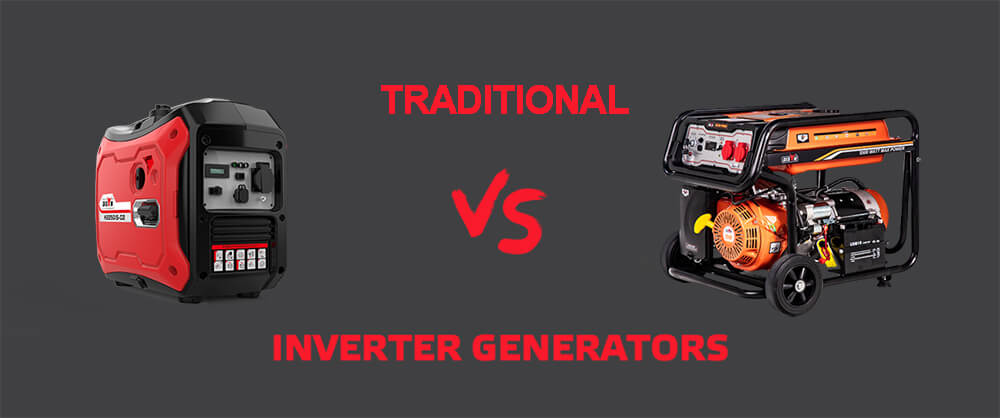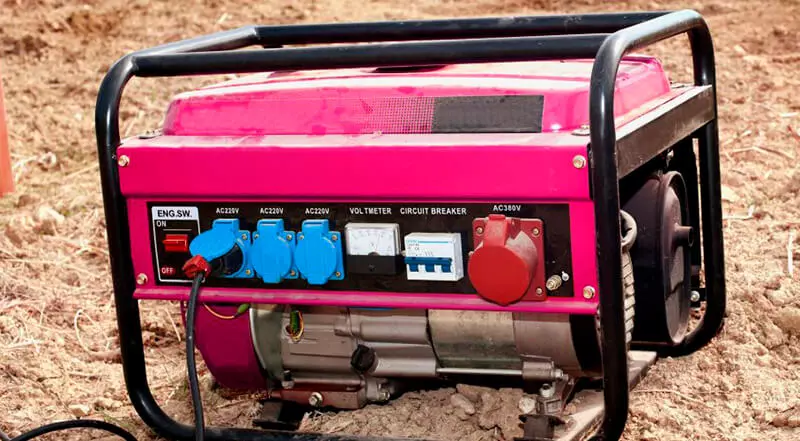23Mar 2024
table of contents

Generators are a reliable source of power in all aspects of life, acting as emergency lifelines during residential power breakdowns, supplying auxiliary power to commercial establishments, or improving experience of camping and outdoor pursuits. User-friendly, portable and reliable, they are indispensable for meeting different power needs.
Today, however, the rules of the game are changing as a new trend sweeps generator world – inverter generators. Providing a different experience in many aspects, let us follow this article to understand the main differences between inverter generator and traditional generators. We’ll delve into their mechanisms, compare their pros and cons, and understand why inverter technology is growing in popularity. Whether you are a first-time purchaser, an experienced importer considering a replacement, or simply interested in evolving generator technology, this comprehensive article may meet your needs.
Inverter generator is represents a superior, more streamlined, and quieter variant generator type. Its operational mechanism consists of three fundamental phases - initial transformation of fuel into alternating current, subsequent conversion of this alternating current to direct current, and final reconversion of direct current back to alternating current at the necessary frequency and voltage.
To break it down, let's start with the key aspect, engine. Similar to traditional generators, inverter generators run on a variety of fuels, with common choices being gasoline or LPG. Drives an alternator to produce high-voltage, multi-phase alternating current.
However, unlike traditional generators that stop there, inverter generators introduce two additional steps. The raw alternating current generated initially is converted into direct current. This conversion to DC eliminates any fluctuations and inconsistencies in voltage or waveform.
The inverter module then steps in to "invert" the stable DC power back to AC power. However, this time, resultant alternating current is clean, consistent, and "pure sine wave" power, ideal for electronics that require delicate handling.
In the subsequent segments, we'll explore benefits it offers and aspects you might need to contemplate when deciding between two.
Clean and stable power: Inverter generators are good at producing pure sine wave alternating current. This produces a stable, clean power output that almost mimics the quality of power you get from the grid. This advantage means sensitive electronics and appliances are protected from any damage caused by power surges or fluctuations.
High fuel efficiency: Intelligent electronics within inverter generators allow them to adjust based on actual power demand, rather than running at a constant speed like traditional generators. They can reduce engine speed when less power is needed, thus saving fuel. Over time, improved fuel efficiency means lower operating costs.
Reduce noise: Gone are the days of roaring, destructive generators. Due to their design and intelligent load sensing, inverter generators run quieter than traditional generators. This feature makes it ideal for use in quiet areas such as campgrounds and during events in residential areas.
Parallel compatibility: A significant advantage of inverter generators is their ability to be connected with another compatible unit. The ability to parallel provides amplified power output without the necessity to transition to a heftier generator. This offers both flexibility and adaptability, eliminating the need for a larger investment.
Compact and lightweight: Inverter generators are designed to portable and user-friendliness in their designs. Generally smaller, lighter, and more ergonomically crafted than traditional generators, these generators are excellent choice for camping trips, or any circumstances that call for effortless transportation.
Low emissions: Thanks to their energy-efficient functioning style, inverter generators produce fewer emissions than classic generators. These characteristics render them more eco-friendly and fitting for regions that uphold stringent emission rules.
Beyond that, some of the advantages include:
Easier to start: Many inverter generators are equipped with electric starting system, simplifying process of starting up generator to a mere button press.
Advanced features: Some newer models of inverter generators have features such as Bluetooth connectivity and remote start, allowing you to remotely monitor and control all aspects of the generator.
These numerous advantages may make an inverter generator an ideal choice for individuals or businesses with specific power needs.

Of course, let’s delve into traditional generators and their fuel types:
Traditional generators, often referred to as conventional or portable generators. They are typically larger and designed for heavy-duty power production and are suitable for meeting large power demands.
These generators generate alternating current directly from an internal combustion engine operating at a constant speed, typically 3600 rpm. This continuous speed ensures a stable output frequency of 50Hz or 60Hz from the power supply.
In terms of fuel type, traditional generators include:
Gasoline: Due to its widespread accessibility, gasoline is likely most popular fuel choice for conventional portable generators. It provides a high power yield and generally presents ease of use for a majority of individuals.
Propane (LPG):Generators running on propane stand out for their storage capabilities and lifespan. Compare to gasoline, propane does not degrade over time, so it can be stored longer. Moreover, these propane-based generators often operate more quietly compared to other alternative fuels.
Dual-fuel: Some generators offer dual fuel systems, allowing to switch between two fuels based on availability and requirements, usually gasoline and propane.
The following offers an in-depth comparative analysis between inverter and traditional generators:
Size: Traditional generators are typically larger and designed for heavy-duty use. While traditional generators provide a high power output, they compromise on portability. Conversely, inverter generators are generally compact, designed for easy transport, and prioritize portability, making them an excellent selection for outdoor environments and comparable situations.
Noise level: Because of their ability to match engine speed to power demand, inverter generators are more quieter, they produce less noise, which run at a constant high speed regardless of load, often resulting in louder operation.
Portability: Due to its compact size and lightweight design, inverter generator has excellent portability. traditional generators has high power output and tank size, so that heavier and larger.
Clean and stable power: Inverter generator has advantage of clean and stable power. Inverter generators create a "pure sine wave" output, mirroring grid power with near-perfect accuracy. This feature is crucial when running sensitive electronic devices that require stable, clean power without sudden spikes or drops. While it comes to supplying power to standard appliances, traditional generators are certainly good choice.
Fuel efficiency: Inverter generator is designed to modify their operational speed based on the power requirement, resulting in reduced fuel consumption when power load is low. This results in higher fuel efficiency overall, making these types of generators more economical and environmentally friendly over time. However, traditional generators run at a constant speed regardless of load, so their fuel consumption remains stable.
Type of device: For running sensitive electronic equipment such as laptops, smartphones, inverter generators reign supreme due to their clean, stable power output. Conversely, while traditional generators may not be best suited for driving delicate equipment, when used for powering larger appliances and performing heavy-duty tasks where minor power fluctuations can be better.
Maintenance: two type generators necessitate regular upkeep, however, due to their larger size and design, traditional generators may demand more frequent maintenance. In contrast, inverter generators often have easy to maintain features and diagnostic tools to help ensure smooth operation.
Price: Owing to their high-tech design, inverter generators usually carry a higher price tag. Though traditional generators aren't inexpensive, they typically offer a more affordable cost per watt of electricity produced.
Parallel operation: The unique advantage of inverter generators is ability to connect multiple units to obtain greater power output, a feature that traditional generators generally do not have.
Emissions: Inverter generators are engineered to curtail emissions in alignment with rising environmental consciousness, and this might be a decisive factor for certain purchasers.
Understanding these differences can help you evaluate your needs and make an informed decision when choosing between a traditional generator and an inverter generator.

To summarize, the main differences between inverters and traditional generators are size, noise level, portability, power quality, fuel efficiency, suitability for different types of appliances, maintenance, price, parallel operation capabilities and emissions. Inverter generators provide a silent, portable, and fuel-saving operation, delivering clean, steady energy well-suited for delicate electronic devices. While traditional generators provide high power output, are better suited for heavy-duty equipment and situations where noise levels and size are not of primary concern.
Taking all these factors into consideration, you may be in the market for options that are reliable, efficient, and user-friendly. This is where BISON inverter generator comes into play.
Focused on delivering clean energy, improving fuel efficiency, reducing operating noise and being easy to carry, BISON inverter generators are designed to meet a variety of power needs, from camping trips to backup home power.
Ultimately, your decision between a traditional and inverter generator will primarily hinge on your specific needs, budget, and desired features. Our aim is to help identify what suits you best, and we trust that this article will contribute towards your informed decision-making process. Bear in mind that irrespective of your choice, careful operation and maintenance of your generator remain crucial for its longevity and optimal performance.
inquiry form here
BISON BLOG, All the latest news and views from Bison Machinery.